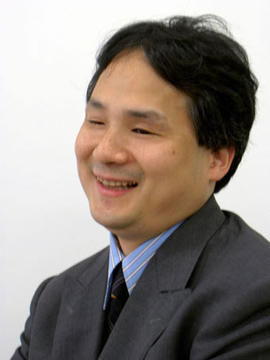I Want to Learn How to Think Beyond Academic Disciplines
Vol.6 2010.03.18 FUKUSHIMA Satoshi
Disability Studies and the Body through the Eyes of a Deafblind
What is "disability"? In common parlance, it means that for some reason various functions of one's body do not work normally, but is this an objective, static, absolute concept?
For example, if someone is nearsighted and finds it hard to see distant objects, we do not call that person "disabled" as long as she/he can correct her/his eyesight with glasses. Why is this the case? Disability Studies is an academic discipline that tackles such questions.
Disability Studies is an ideological practice as well as an intellectual exercise that posits disability as an analytical perspective. It is an academic discipline that captures and sheds light to disabilities and persons who have them from a new viewpoint that differs from those traditionally held by Medicine and Rehabilitation Studies.
"Disability" is an artificial concept. It is a concept determined by a society at a point in time with specific purpose(s) in mind. In other words, disability is not something statically substantive; rather, it is essentially a state, situation, relationship itself that is "constructed" and "reproduced" by the society. In this way, we can see various themes that need to be explored.
With this background, in this lecture we will think about two aspects: "ability" and "culture." We will begin with the state of being "deafblind," a state I am experiencing myself.
First, the students will have a "deafblid simulation experience" and think about disabilities concerning sensory functions of seeing and hearing and support by others as a supplementary activity. That will help them see firsthand that ability does not end within oneself.
Furthermore, by grasping the potentials sensory disabilities hold for connecting with a new world of communication, we will think about the aspect of a "unique culture" hidden in disabilities.
- Instructor
-

- FUKUSHIMA Satoshi
- Professor at Barrier-Free Project, University of Tokyo Research Center for Advanced Science and Technology Professor Fukushima lost his eyesight at age 9, then his hearing at age 18, and has since lived as a deafmute. He invented with his mother a communication method called "finger braille," in which words are communicated through touching the tips of the speaker's fingers. He uses simultaneous translation by finger Braille translators in daily life. He has engaged in many projects of research and social activism such as joint research with corporations and making recommendations for public administration. His many books include, among others, Deafmute People and Normalization: In Search of a Healing and Convivial Society. He has also received numerous awards.
- Other Lessons